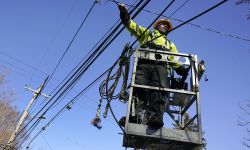Michigan Senate moves to crack down on payday lending, rein in interest rates

- Senate-passed bills would cap annual interest rates and fees on payday loans at 36%
- Supporters say the cap would curb predatory lending practices that saddle vulnerable residents with debt
- Critics argue the plan would put legitimate lenders out of business and drive people who need cash to unregulated markets
Interest rates on quick-cash loans would be capped at 36% annually under bills that cleared the Michigan Senate on Thursday, a move supporters say will protect borrowers from predatory loans.
Michigan law currently allows short-term, high-interest cash advance loans of up to $600 that come due on the borrower’s next payday.
Supporters of the measure that passed with bipartisan support in the Senate Thursday say tougher regulations would protect the working poor from getting into a cycle of debt that is tough to escape.
“Michigan payday lenders disproportionately locate their stores and communities of color and rural areas,” Sen. Sarah Anthony, D-Lansing, said in a Thursday floor speech. “Predatory lending has the biggest impact on family farmers, on working poor, and…low-income individuals in every corner of our state.”
Related:
- Michigan Democrats eye new ethics disclosures, crackdown on gifts
- Michigan bottle returns fall after COVID, prompting get-tough push on grocers
- Time for toll roads in Michigan? Lawmakers revive debate
Several Republicans joined Democrats in supporting Anthony’s bill, which passed in a 24-13. A separate bill from Rep. Jennifer Conlin, D-Ann Arbor, that would require additional reports to the Legislature on payday lending passed the Senate unanimously.
The proposed 36% cap would put Michigan in line with 20 states and is supported by the Michigan League for Public Policy, the Michigan Catholic Conference and several consumer groups.
Payday lenders are allowed to charge fees and interest rates on a sliding scale based on the amount borrowed.
Michigan’s law now allows interest of up to 15% on the first $100 of loans. The interest rate falls to 14% on the next $100, and continues to decrease as borrowed amounts increase up to the maximum $600.
Under the current system, borrowers who are loaned $100 for two weeks would be required to repay $115, an annual percentage rate that according to the Attorney General’s office works out to 391%.
Under the proposed changes, borrowers who took out the same $100 loan for two weeks and were charged 36% annual interest would be required to repay $101.40.
Advocates say fees now can quickly add up, thrusting borrowers into a cycle of taking out more loans in order to make payments.
A 2018 study by national financial advocacy group Center for Responsible Lending found that 70% of payday loans in Michigan are taken out on the same day a previous loan is repaid, and 86% are taken out within two weeks of another repayment.
“People in difficult financial circumstances looking for short-term help should be protected from predatory lending practices designed to keep them in debt,” Tom Hickson, vice president for public policy and advocacy for the Michigan Catholic Conference, said in a Thursday statement.
But some Republicans say the restrictions would drive legitimate lenders out of business and force desperate cash seekers to seek money from less reputable sources.
“The Tony Sopranos of the world will say this is good for their business,” said Senate Minority Leader Aric Nesbitt, R-Porter Township, referring to the TV mobster.
“I say this is bad for folks in need of these short-term loans.”
The legislation follows an effort in 2022 to allow voters to decide whether to set a 36% cap on payday loans and give the state attorney general more power to prosecute lenders who break the law. Organizers couldn’t collect enough signatures to put the measure on the ballot.
The Senate-passed bills now head to the House, and would need approval in that chamber and sign-off from Gov. Gretchen Whitmer to become law.
See what new members are saying about why they donated to Bridge Michigan:
- “In order for this information to be accurate and unbiased it must be underwritten by its readers, not by special interests.” - Larry S.
- “Not many other media sources report on the topics Bridge does.” - Susan B.
- “Your journalism is outstanding and rare these days.” - Mark S.
If you want to ensure the future of nonpartisan, nonprofit Michigan journalism, please become a member today. You, too, will be asked why you donated and maybe we'll feature your quote next time!




